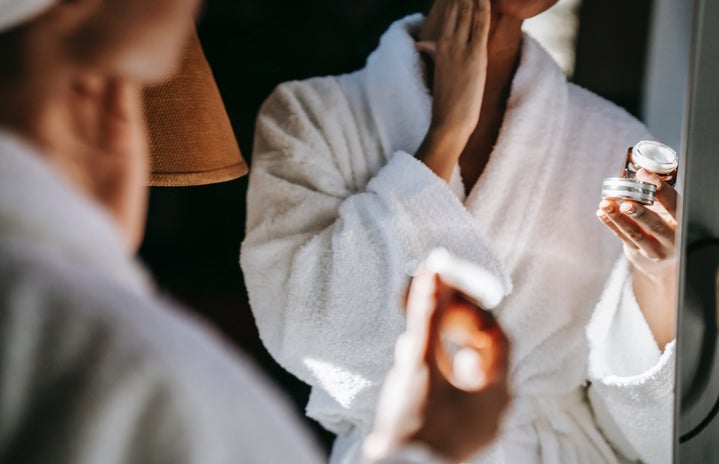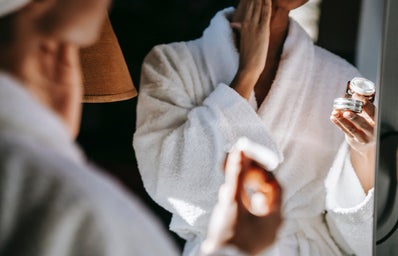Let me ask you this: when was the last time you thought about incorporating an anti-aging product into your skincare regimen? If it was never, why do you think that is?
Most college-aged women are preoccupied with a laundry list of things to do, but usually, preventing premature aging is not one of them. Despite this, dermatologists advise it’s best to start preventative skincare as early as your late teens and early twenties.
But why should we care about premature aging if our skin is showing no signs of wrinkles or dark spots? Well, the answer is quite simple: most anti-aging skincare is precautionary, meaning that you should start incorporating it into your routine far before signs of aging actually become visible.
With many gimmicky products promising to “turn back the clock” on the market, it can be hard to know where to turn. Her Campus has compiled 5 dermatologist-recommended anti-aging steps that you absolutely must add to your beauty regimen to keep your skin looking younger, longer.
- Wash your face
-
No, like seriously. Although many collegiate women are more likely to look at face wash as a way to prevent acne and not aging, don’t discredit a simple cleanser, because it can actually do both! As we go about our days, environmental factors like pollution build up on our skin. If this, as well as products like makeup and sunscreen, are not properly washed off, it can actually lead to collagen breakup.
Collagen is the most abundant protein within our bodies and it is attributed with keeping the skin looking plump. When we undergo collagen loss, it causes the skin to lose elasticity and become more thin, therefore making it more susceptible to fine lines and wrinkles.
Not only should makeup, pollution, and SPF be washed off in order to prevent collagen breakdown, it is also an integral step in promoting skin cell replenishment overnight. In order for your skin to turnover cells and undergo DNA repair, it must have oxygen. By sleeping in makeup, sunscreen, and pollutants, the skin does not have access to this vital nutrient, and it has to work extra hard to try to repair, which makes aging prevention much more difficult and unlikely.
- Sunscreen, sunscreen, and yes, more sunscreen
-
Although it might feel great to soak up the sun’s rays on a hot summer day, this is actually one of the most common ways you can hurt your skin. Photoaging is the process by which our skin is permanently damaged by ultraviolet light. According to Yale Medicine, signs of photodamage like wrinkles, age spots and decreased elasticity start becoming visible in the teens and early twenties.
Our skin is damaged by the two types of ultraviolet radiation: UVA and UVB rays. UVA rays damage all layers of the skin, which usually adversely affects the collagen and elasticity deep within this vital organ. Alternatively, UVB rays only damage the outer layer (or epidermis), more harshly altering DNA and causing photoaging and even precancerous cells along the way.
So, how can we protect ourselves from sunlight?
Using a broad spectrum sunscreen is one of the key tips recommended by dermatologists (aside from staying in the shade and wearing covering clothing), but not all sunscreens are made the same. The two major types of SPF are physical and chemical. Physical sunscreen offers skin protection through active mineral ingredients that work to deflect UV rays, while chemical sunscreens create a chemical reaction within the skin that converts UV rays into heat, which is then released from the skin. Chemical sunscreens are absorbed into the skin whereas physical SPF is not, so make sure you are using whatever you deem most protective and comfortable so that you can apply a generous amount to the skin at least every two hours.
- Start using a retinol
-
While most products that promise to “turn back the clock” are likely just a marketing trick, if they include retinoids, they probably aren’t. Retinoids are vitamin A derivatives that have been scientifically proven to have aging-reversal properties. Retinoids work by mitigating the free radicals within our skin so there is a smaller chance of collagen breakdown. In addition, retinoids can even promote collagen production. Furthermore, retinoids can prevent other skin conditions such as acne (by declogging pores) and psoriasis (by slowing skin cell growth).
There are several different types of retinoids available, but the one you’re most likely to hear about is retinol. Retinol is available over the counter, while other retinoids like Tretinol are prescription only.
Retinol is a very strong ingredient so it must be handled with care. To start incorporating retinol into your skincare routine, apply a pea-sized amount to dry skin (after washing your face) a few times a week. It is suggested to start retinol use at a very low concentration, somewhere between 0.01% to 0.03%. Studies suggest it is best to work your way up to 0.25% or a little higher in order to see results; however, if you have sensitive skin or you are not tolerating the ingredient very well, it is advised to not increase the concentration and instead stay at lower percentages.
Retinol is known to increase photosensitivity (skin sensitivity to sunlight) so make sure you are applying it only at night and using SPF regularly. It takes the skin several weeks to adjust to the ingredient, so pay attention to any moisture fluctuations or signs of inflammation, and adjust your retinol use to a smaller or less frequent amount if necessary.
- Be gentle with your skin
-
Being too aggressive with your skin is known to cause inflammation and redness, but did you also know it may also lead to signs of aging?
Simple everyday tasks like washing and drying your face can actually create fine lines and wrinkles. When you use harsh physical exfoliants like washcloths or scrubs, it can cause microtears within the skin, which gradually weakens the skin barrier and causes hypersensitivity. This makes it harder for the skin to replenish itself and protect itself from sunlight, ultimately leading to signs of aging.
Also, make sure you are aware of the ingredients in your products, as some of them may be naturally very rough on your skin. Ingredients like alcohol and fragrances can make your skin dry and irritated, also breaking down the skin barrier and making your skin more susceptible to aging.
- Get educated!
-
In order to improve anything, you must be prepared. Learning about how certain ingredients help or hurt your skin is vastly important in order to improve both your appearance and health. Some of my favorite ways to stay educated and boost my routine are through social media, especially on YouTube. Skincare YouTubers like James Welsh, Hyram, and Dr. Dray produce easy-to-watch content that is both educational and interesting. But if YouTube isn’t your cup of tea, skincare creators also use other platforms like Tik Tok and Instagram to get out information that is much shorter but typically less in-depth.
Although it’s incredibly important to take care of your skin, try to not stress about wrinkles or age spots, because aging is just a part of life


